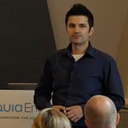You highlight how the very fabric of Volkswagen—its processes, communication styles, even its physical spaces—were profoundly intertwined with the old mindset. Any change management effort that fails to grasp the deep-seated influence of these "hidden" corporate messages will inevitably struggle to reshape the organizational culture or change it to the degree expected by the change program. The concept of "rear-view mirrorism" serves as a powerful lens for understanding Volkswagen's dilemma. It is indeed tempting, especially in the automotive domain, to assume that the future will merely be a linear extrapolation of the past, overlooking the disruptive shifts that may be lurking just around the corner or failing to spot the iceberg ahead of time, metaphorically speaking. The metaphor of the Titanic comes to mind here, given the enormous size of Volkswagen. You have masterfully showcased how deeply ingrained narratives, often rooted in past glories or perceived strengths (in the case of Volkswagen that was the perception of exceptional German engineering) can become obstacles to adapting to a rapidly evolving technological and competitive environment. In a sense, it's as if the corporation's own story becomes a cage, inhibiting its ability to evolve. This also brings to mind the idea of how corporate cultures, like dominant narratives in societies, can become simulacra in Baudrillard's terms. The narratives Volkswagen believed in became disconnected from reality, masking the urgent need for a fundamental change. The point about the need to align change management with the evolving demands of the media landscape is both critical and timely, particularly in our hyper-connected, digitally-driven world. Your case study serves as a potent reminder that narratives, whether corporate or societal, must be continuously reevaluated and adapted to the ever-shifting landscape, otherwise the gap between perception and reality will inevitably widen. The challenge, as you aptly point out, lies in striking a balance between embracing the future and honoring the past, a dynamic that requires both vision and courage. Volkswagen's "too little, too late" approach ultimately reflects a failure to fully grasp the implications of the evolving media ecosystem. This resonates deeply with McLuhan's observation that we often fail to perceive how the tools we create shape the very fabric of our existence.
2 min readNov 5, 2024
Written by Mohammed Brückner
Authored "IT is not magic, it's architecture", "The Office Adventure - (...) pen & paper gamebook" & more for fun & learning 👉 https://platformeconomies.com !
